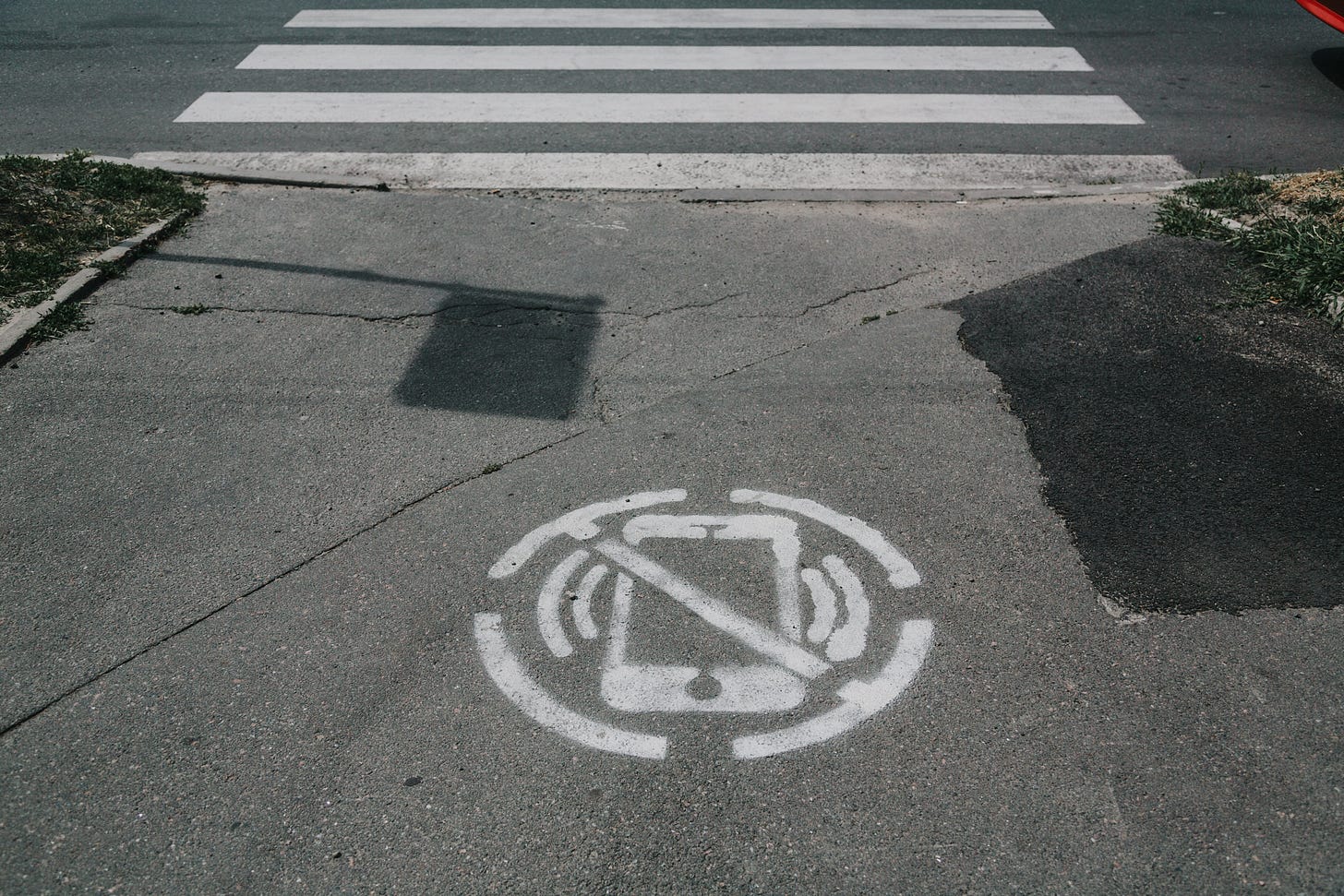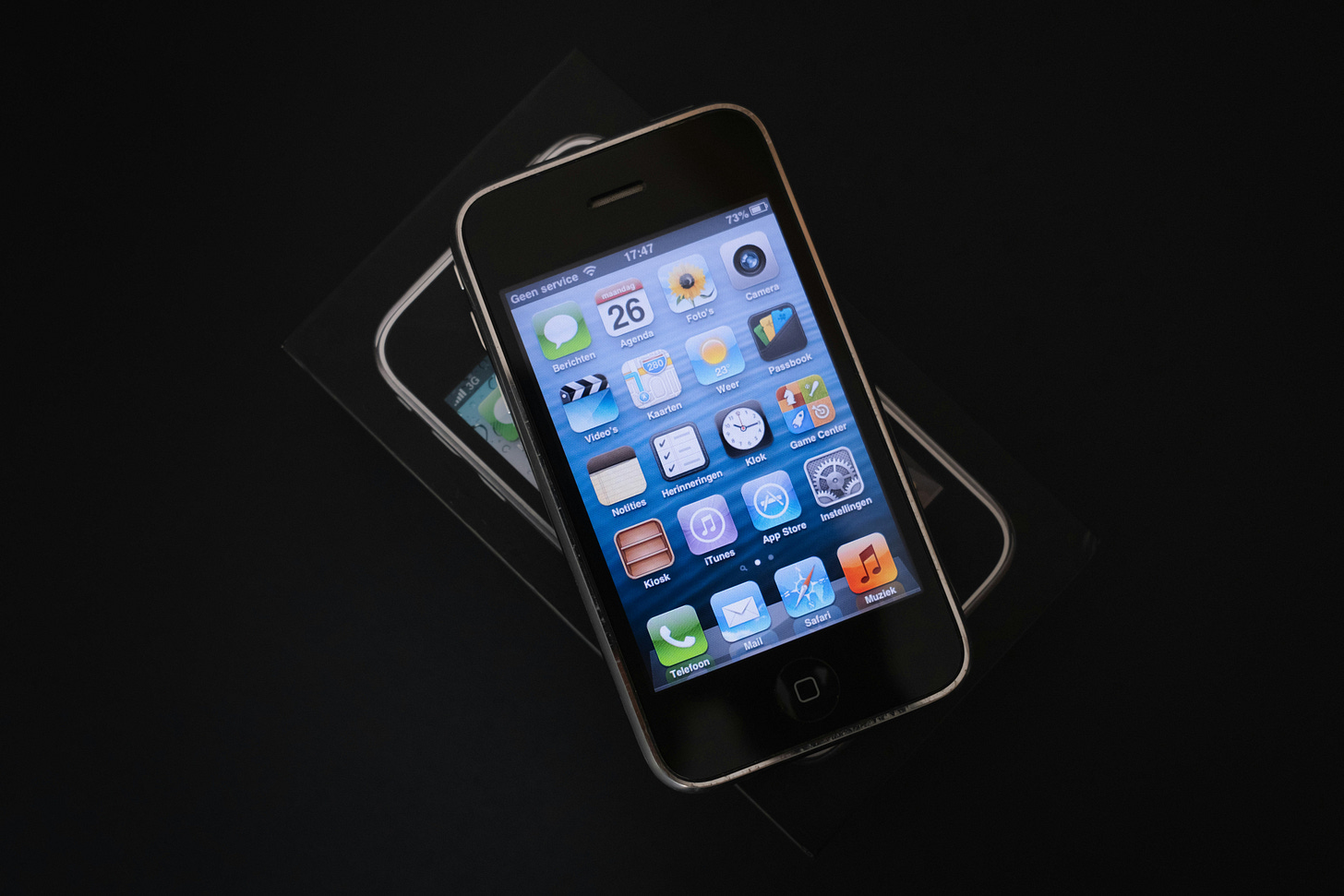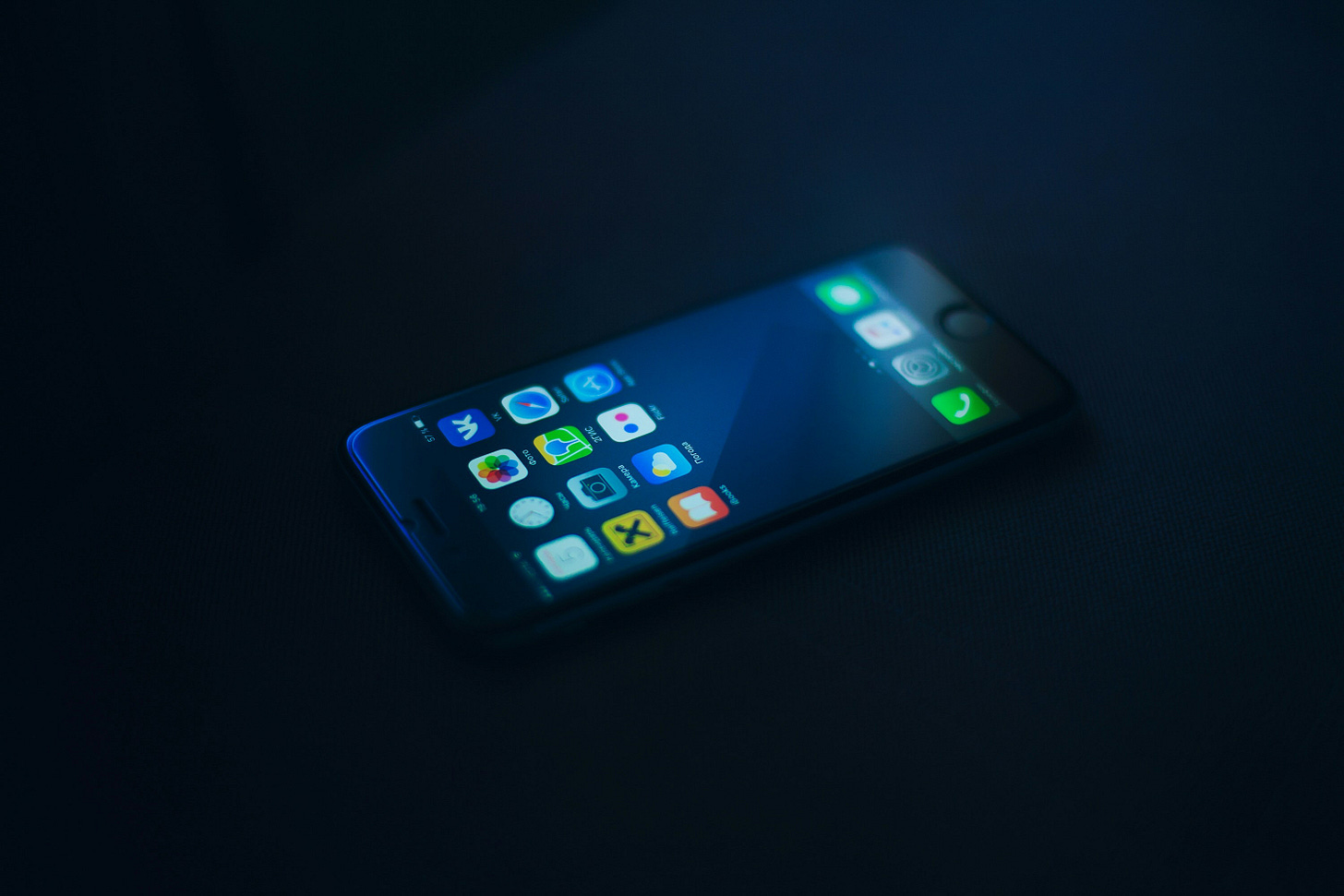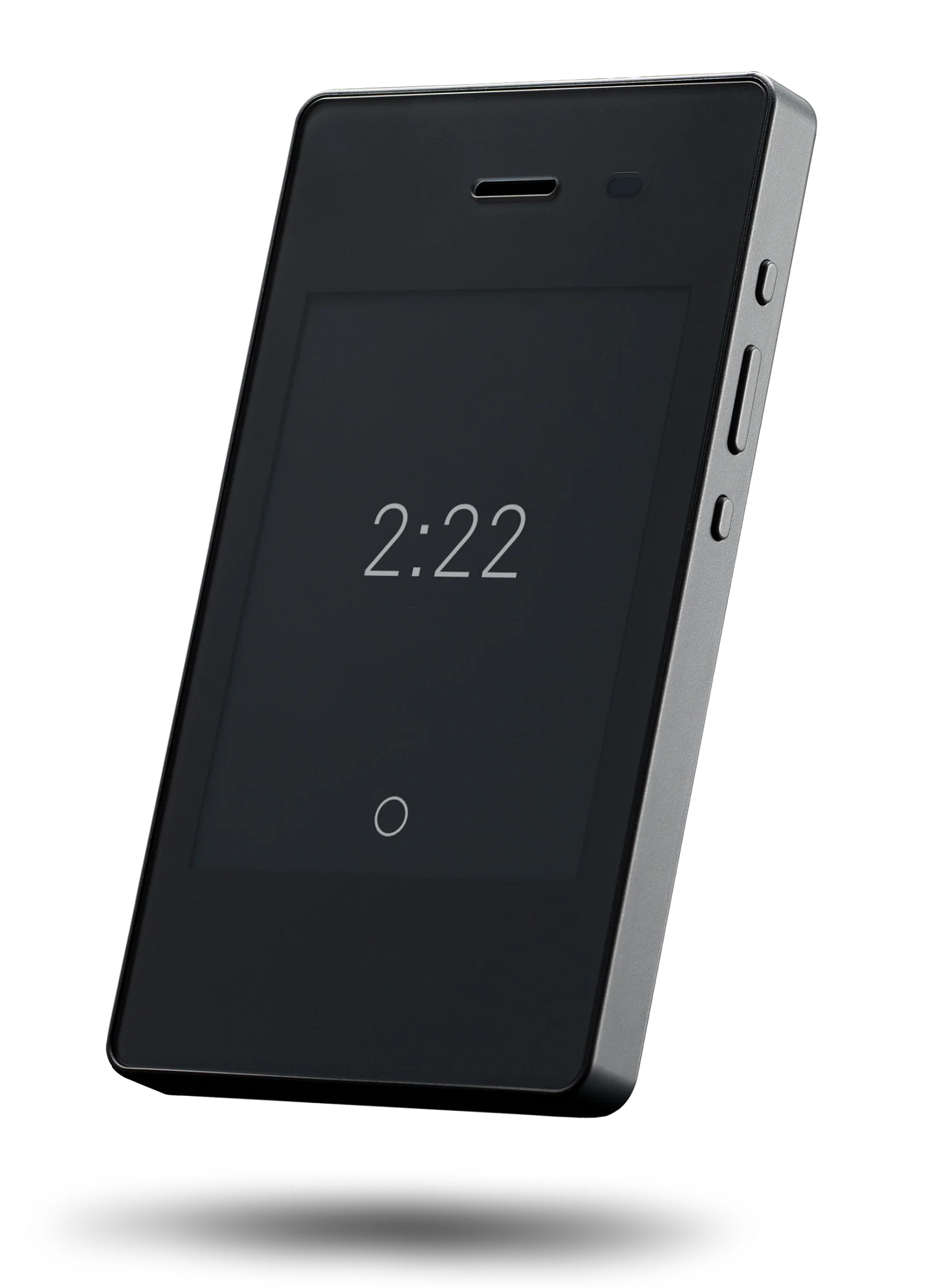It starts with stoplights.
Pulling up to a four-way stop, sitting at your steering wheel, looking into the abyss of an intersection, waiting for something to happen, and nothing ever does. You sit, you breathe, try to listen to the interminable hum of existence, and the light changes. Then on you go with your day.
There are a hundred such interruptions in a day, each as small and significant as this, and I never noticed any of them.

For well over a year now, I have lived without a smartphone. The experiment in disconnection began by giving away my iPhone to my stepdaughter and seeing how long I could go without a mobile device.
I’d long since grown tired of being so accessible and available to everyone and anyone, exhausted by an excessive tetheredness to a tool that had been meant to liberate me and accomplished the opposite.
I remember the first time I saw one. It was 2008, and I was getting married, and my friend Jared brought his first-generation iPhone to the wedding. We had toured in a band together, Jared and I, and he was the only person who brought his laptop on the yearlong tour. He was an early adopter.
“Can I see that?” I asked when I saw my friend snapping photos on his new phone. I’d heard about it, of course; at this point, we all had. But it was still new, this piece of technology, not something guaranteed to be bulging out of the pockets of everyone you met.
He handed me the 3G, and as I fingered the phone with curiosity, Jared instructed me, a new potential convert: “Here, take a picture—yes, like that—then tilt it like that. Yeah, now… turn it back.”
Watching the photo I’d just taken flip its orientation, one way then the other, as I tipped the device back and forth, I was amazed. We all were. Here was a tool that could take photos, make calls, play music, access the Internet, and more. It offered an unprecedented opportunity to connect with a world that was becoming increasingly connected.
Plus, it looked cool. At this point, there were Blackberries and cell phones, devices with email and Internet browsers and games. But nothing like this. Before the iPhone, no one even knew to ask for such a thing. After, it was all we wanted.

But all things have an end, and after years of wrestling with the decision, after getting off social media and experiencing little to no withdrawal symptoms, I figured I’d try the same with the smartphone. It was an old love affair but one that had worn out its welcome.
I’d owned the 3Gs (got one that same year Jared showed me his), a 4, then a 5, a 6s Plus after that, an 8 Plus, and an X, an 11, and then finally a 13 Pro. I was not even a power user; many of my friends got annual upgrades, even subscribed to a plan that entitled them to do so as often as there was a new model.
The iPhone had allowed me to build an online platform; it’d been critical in helping me establish my brand as a writer and grow a following of online readers. It also allowed me to stay connected to friends and family, even reconnected me to people from my past.
It had largely been a gift, this device, but it was a toy that came with consequences—chiefly of which, I could never put it down. I didn’t like this part of owning a smart tool, didn’t like how much control it had over me, how I’d pull it out when bored and look up, twenty minutes later, wondering where the time had gone. I hated how I felt after being glued to its blue screen for an evening.
It never left me feeling rested or happy, only unnerved and wanting more.
I went cold turkey, not replacing the phone I’d just given away. This lasted about a month before things got a little hairy: unpaid bills, checks bouncing, friends unable to contact me during emergencies (one had become terminally ill and almost passed away without my knowing). When I was trying to pay my mortgage and got locked out of GMail with no means of logging back in without a phone, I caved.
The replacement device I finally decided on was not another iPhone. It was barely a phone at all.
It started out as an art project, the LightPhone, something fun a designer in Brooklyn made in an attempt to get his attention back. He didn’t want another thing that demanded his focus; instead, he wanted to create something to be used as little as possible.
He got what he set out for. The device is small, half the size of your hand. It’s all black or gray, with an E-ink display, like a Kindle, and when you type on its digital keypad, the phone vibrates, as if there’s sand in the tiny rectangle, a grainy reminder of an Etch-a-sketch.
When I got mine, it did not impress, and I liked that very much. The LightPhone did so little that most of the time I left it on the bathroom counter, plugged in, or forgot it in my bag, my car, or in a drawer somewhere in the house—often for days on end. It was entirely forgettable, and as I began to forget what it was like to have a phone, much less use one, a curious thing happened: I remembered how to see, how to listen, how to experience.
I first noticed the change in my car. At four-way stops, a familiar itchiness would arrive, and I wouldn’t have anything to do. Nothing to distract, nothing to touch or tap or scroll. I would look around, fidgeting with this or that, turn the radio on and tune to a station, try to see into other vehicles.
Eventually, the itch subsided and I began to enjoy the noisy quiet of a car ride, listening to the rattle of wind on the less secure parts of my Toyota sedan.
The following summer, my wife and I spent a week in England and had to find a SIM card that worked. We had no Uber, Venmo, or easy means of getting to and from an airport. After a few calls, though, we found our way.
Returning from the trip and swapping the SIM cards back, I was relieved to discover my phone no longer worked. I turned it on, checked it—no service—turned it off, back on again, checked once more, and gave up. After that, I resolved to live without a phone entirely, like Thoreau.
This lasted for two months. Trips to pick up kids, routes to the gym and grocery store, were easy enough to navigate. Even trips to other cities were relatively effortless as printed-out maps were sufficient to guide me.
Daily life at home was a cinch. I was able to communicate with friends easily, taking calls on Zoom or Google Voice and texting friends with iMessage on my MacBook. Eventually, I began to hear complaints from friends and colleagues who couldn’t reach me. Again, the issue with websites and banks sending codes I couldn’t access was a problem. It was, I surmised, time to rejoin the land of the virtually alive.
“It is the world’s worst phone,” I like to tell friends, proudly displaying the object of my liberation, “and I love it.”
I replaced the non-working LightPhone with a newer model that was almost as ineffective, continuing to use it only in times of emergency and dire need. “This is a terrible phone,” my wife texted one day from her respective device, “it took me five minutes to write you this.”
We laughed, then vowed to never communicate with each other on these things again. For better or worse, we have both kept this solemn marital vow. “It is the world’s worst phone,” I like to tell friends, proudly displaying the object of my liberation, “and I love it.”
As far as phones go, the LightPhone is pretty bad. There are no apps on it, not really. There’s a calculator and something to take notes, but I’ve never used either. Apparently you can download MP3 files if you connect this thing to that—I haven’t even bothered trying.
It’s not easy to type on, can’t Google things for you or take pictures or stream videos. The reception is spotty at best and the GPS unreliable. I wouldn’t trade it for anything. It does the job just fine, which is to say it does the job very poorly, and that is as it should be.
Switching to a “dumb phone” has allowed me to get my life back, because it does precisely and only what a phone should do: send and receive calls and the occasional text message if absolutely necessary. It also helps me separate the personal from the professional.
Most days, I cannot be reached after 5:00 p.m. Not by phone, not by text, not even by email. If you need me, you’ll have to come ring my doorbell, like the roofing guy has to do. Yes, you can try to call. You can send a message, if you’d like, but it’ll wait in the inbox with all the others. And for an evening, I will have no idea what is going on in the world, and I will be very happy.
“I bet you are, like, way more productive now,” someone said to me as my pitiful phone spilled out my pocket in front of a group of men. I’d arrived at the cigar bar a few minutes late and was already complaining about my phone. After the GPS had failed me, I was forced to find the place the old-fashioned way—by getting lost and asking for directions.
So when I, a little bedraggled, picked up my sad excuse for a mobile device and placed it on the table, it attracted immediate attention. It always does.
“I want one!” one of the men said after I explained what it was and how little it did.
Everyone loves the barely working phone. Its presence prompts all sorts of response, including promises from friends, family, and strangers to “get off this thing” just as soon as XYZ occurs. This “thing” being their phone, and XYZ always being something different. When they retire. When they transition out of this demanding job. When the latest launch is over. Etc. You name it, whatever it is, it’s always later. Hell, apparently, is other people pledging to quit their iPhones.
Like sobriety, the phoneless life is a path one must choose for themselves, if at all. It must be something that makes sense for you. As for me, I’ve made peace with my decision; it is not an uncomplicated life but one far less complex than its precedent: a life of endless demands that no amount of hustle could satisfy.
No, I am not, like, way more productive now. If anything, the opposite: I produce a lot less. I consume a lot less, too, unless you count books—and no one does.
I am, however, far from a Luddite. Every week, I work at a desk, staring at a screen, meeting clients, typing on a keyboard. I send texts and emails to friends, family, and coworkers. And when the day is done, I am done. Done with screens. Done communicating with the outside world.
I need a retreat, to abscond to some place that cannot be reached by those who do not know the way. I need a seventy-year-old record on a fifty-year-old turntable, a meal that takes two hours to prepare and must be enjoyed over candlelight.
I need ritual: some artifact of existence that can not be remixed or overdubbed or tweaked by AI. If I am to read, I will read inky words on pulpy pages felt between fingers while sipping a drink on the patio. I will listen to my wife recite an essay while I make a mess of our kitchen. I will attempt to live.
What I don’t need is another hot take, another twenty-second “short” or some hack for getting more out of life. I don’t want more. This is enough; I want the unproductivity—good, hearty distraction: to get lost in leisure, watching the horizon of another day fade into well-earned oblivion.

I know this is not the direction the world is going. I know it can be difficult for some people to not be able to reach me. There is a certain pleasure, I admit, in being irrelevant to a world that does not know how to be well. I like my slowness.
And as far as I’m concerned, I am quite reachable. “Just come over for a meal,” I tell friends who want to catch up. We’ll get to say more to each other this way, and there will be fried rice. How can you say no to fried rice?
Some come, but most say they will later, once everything calms down. I get it. Life can be harried; it is for me, too. Living without a smartphone is but one way I try to maintain a reasonable pace, one that will hopefully not fry my circuits.
It is my own version of sanity, this disconnected life, and I cannot recommend it. After all, who would I beg to call me an Uber when stuck at a dive bar in some city I don’t know?
How would I pay for parking?
No, I don’t think you should get rid of your smartphone. I think you should live your life the way that you want. And if unrestricted access to every piece of information humanity has ever collected since the invention of language is an opportunity you don’t want to miss, who am I to blame you?
I can’t even pull up a QR code to look at a menu.
Don’t mind me. I’m just over here, barely informed and far from connected, staring at the stars, listening to Paul Simon sing me a story, while I wait for the light to change.
If you liked this, check out:





THIS is what it means to "become more human".
I loved this. I am not ready…but I am doing my own thing. My Daylight Computer finally arrived. I almost cancelled after all the challenges I went through to get it. But I did and I’m glad. When they come up with their own keyboards, I hope to write on it. Low EMF and I think no blue light or minimal…And I will tuck this story in my pocket for now and maybe, just maybe…when I finally buy a place to live and am not traveling full time…maybe I will get a terrible phone too? Thanks for another great post. I really enjoy the way you write and what you write about.